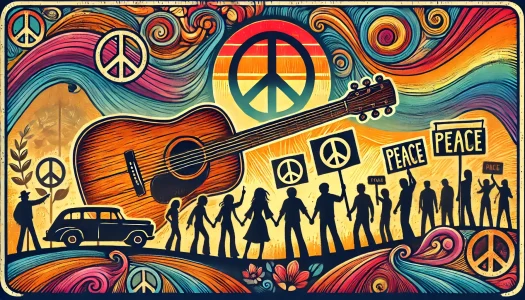The 1960s were a transformative era for folk music, with the genre becoming a soundtrack for cultural shifts, political movements, and personal reflection. Folk artists of the decade intertwined storytelling with poignant social commentary, capturing the spirit of a generation yearning for change. Here’s a list of the top 10 folk songs from the 1960s that defined the era and continue to resonate today.
1. “Blowin’ in the Wind” – Bob Dylan (1963)
No list of 1960s folk songs is complete without this anthem. Bob Dylan’s deceptively simple lyrics pose rhetorical questions that challenge social norms and injustice. With its timeless relevance, “Blowin’ in the Wind” became a hymn for the civil rights movement and a touchstone for folk music’s power to inspire change.
2. “The Sound of Silence” – Simon & Garfunkel (1964)
Paul Simon’s poetic masterpiece speaks to alienation and disconnection in a rapidly modernizing world. Its haunting melody and introspective lyrics turned it into a sleeper hit, later immortalized by its full-band arrangement on Simon & Garfunkel’s 1966 album Sounds of Silence.
3. “If I Had a Hammer” – Peter, Paul and Mary (1962)
Originally written by Pete Seeger and Lee Hays in 1949, Peter, Paul and Mary’s 1962 rendition brought this anthem of justice and equality into mainstream consciousness. Its energetic delivery and clear call for change made it a staple of protest rallies throughout the decade.
4. “Turn! Turn! Turn!” – The Byrds (1965)
Adapted from the Book of Ecclesiastes and set to music by Pete Seeger, The Byrds’ jangly, electric-folk version of “Turn! Turn! Turn!” became a hit in 1965. Its message of cyclical change resonated deeply during the turbulent mid-’60s, blending biblical wisdom with a modern context.
5. “Where Have All the Flowers Gone?” – Joan Baez (1962)
Another Pete Seeger creation, this song found its definitive voice in Joan Baez. Her ethereal soprano brought a poignant clarity to this anti-war lament, turning it into an enduring symbol of the pacifist movement and a rallying cry against the Vietnam War.
6. “This Land Is Your Land” – Woody Guthrie (1940, popularized in the ’60s)
Although penned decades earlier, Woody Guthrie’s populist anthem gained renewed life in the 1960s. Folk revivalists like Peter, Paul and Mary and Pete Seeger embraced its egalitarian message, making it a unifying tune for civil rights marches and labor protests.
7. “Suzanne” – Leonard Cohen (1967)
Leonard Cohen’s “Suzanne” introduced the world to his unique blend of folk music and poetic introspection. With its meditative lyrics and haunting melody, this song set the stage for Cohen’s enduring career as a singular voice in folk music and beyond.
8. “We Shall Overcome” – Pete Seeger and Others (1960)
Although rooted in gospel tradition, “We Shall Overcome” became a defining anthem of the 1960s folk revival thanks to Pete Seeger’s adaptation. Its unifying message of resilience made it a cornerstone of the civil rights movement and a song that still echoes in social justice movements worldwide.
9. “Don’t Think Twice, It’s All Right” – Bob Dylan (1963)
This heartbreakingly beautiful track showcases Dylan’s gift for blending personal storytelling with universal themes. With its wistful lyrics and fingerpicked guitar, the song became a cornerstone of Dylan’s early folk career and a standout on his The Freewheelin’ Bob Dylan album.
10. “Both Sides Now” – Joni Mitchell (1969)
First popularized by Judy Collins, Joni Mitchell’s reflective masterpiece captures the nuanced emotions of love, loss, and self-discovery. Mitchell’s version, released on her Clouds album in 1969, solidified her reputation as one of the decade’s most profound singer-songwriters.
